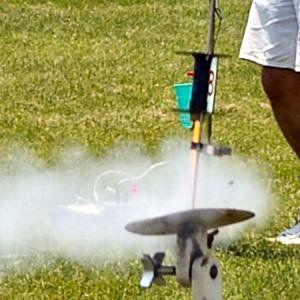Scratch 18mm Spool Rocket Original Design / Scratch Built
Scratch - 18mm Spool Rocket {Scratch}
Contributed by Alex Rothchild
| Manufacturer: | Scratch |

Brief:
It all started on my birthday in 2004. I received two Estes Fat Boys, and I
planned on building them as a two stage rocket, however, one of the body tubes
was completly ripped down the middle because the nose cone was shoved halfway
down inside it. That left me with two Fat Boy kits but only one body tube. I
built the sustainer stage minus the engine hook and looked at the parts from
the other kit. I had two centering rings, a motor hook, a mylar ring, a launch
lug, a chute, and a shock cord.
Construction:
I remebered reading a review about a spool rocket, so I decided to give it a
try. I took the engine tube, centering rings, launch lug, motor hook, and
retainer ring. In about 10 minutes, I slapped all of these parts together to
form a cheap spool rocket.
The construction was easy. It is ideally the motor mount of a Fat Boy. It starts out by slitting the motor tube to place the eningine hook in. I dont know why I put the motor hook in. The ejection charge just goes out the other end anyway. The next step was slipping on the mylar retaining ring, which was tacked in place with thick CA. Next, the launch lug was glued with thick CA to the motor tube. Finally, the two centering rings were placed just over each end, flush with the ends of the motor tube. I had to line up the semi-circle in one ring with the launch lug, and cut another one in the upper centering ring to allow the launch rod to pass through.
Finishing:
I primed it, painted mine blue, let it cure, then slapped on some letter
stickers. On one side I wrote spool and on the other I wrote Alex. Then, I
painted the whole thing black and removed the stickers. Unfortunately. mylar
stickers do not make good masking tape.
Flight:
Flight, like any spool rocket is up, spin, and down. I flew it first in the
fall at a nearby schoolyard on an A8-3. It went slow to about 70-100 feet and
then spiraled back down using tumble recovery. At about 20 feet, the ejectin
charge popped and a burst of flame popped out of the top. I proved to my dad
and sister that spools do fly straight. They thought it was a joke. The next
three flights were in Tewksbury at a CMASS sport launch. I flew it three times.
The first time was on an A8-3. It was a repeat of the first flight: up and
down. Later, I launched it on a B6-4. It went up and down, only faster and
higher. Then I launched it on a C6-5. It went up, probably about 250 feet. I
need to use booster motors though because when it came down the ejection charge
practically went off in the LCO's face.
Summary:
The main PROs for this rocket are the ease of construction and the simplicity
of the parts and design. The only CONs are that during my launches the ejection
charge fires too close to the ground, so a shorter delay is needed. Overall, I
really enjoyed building and flying this rocket. It is a fun build for anyone
with a damaged body tube or other damaged parts.
Sponsored Ads
 |
 |











